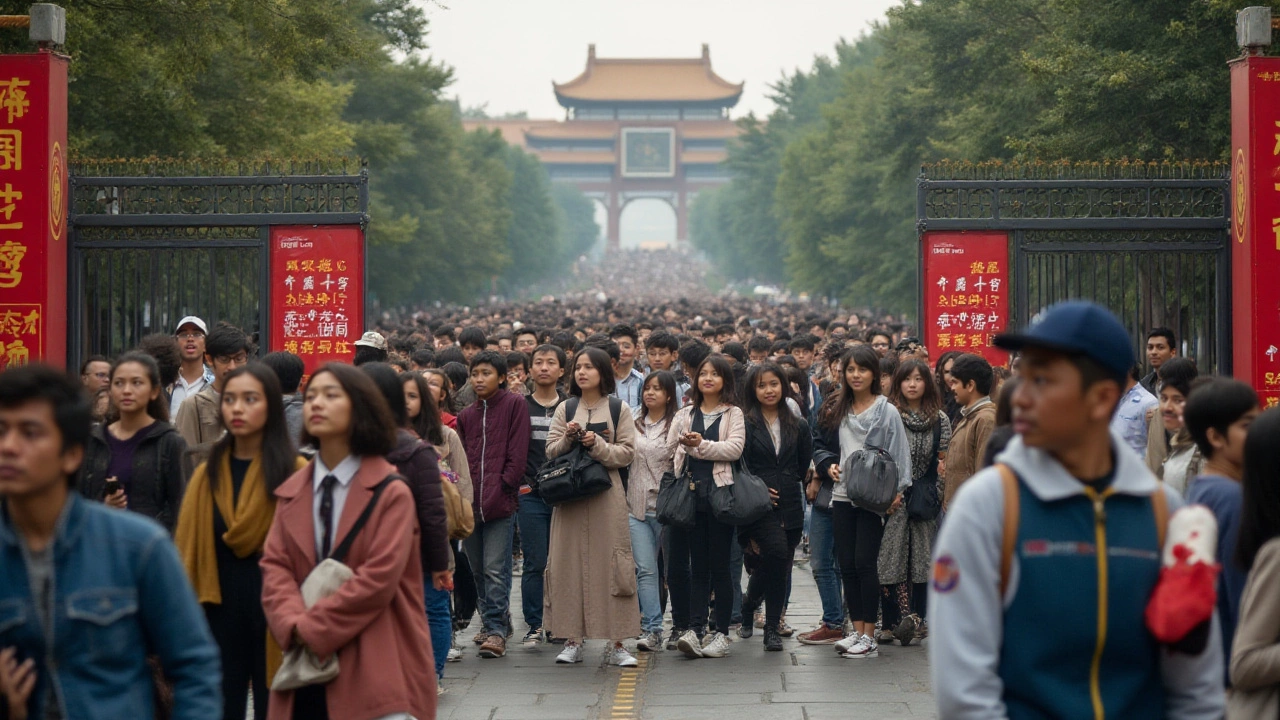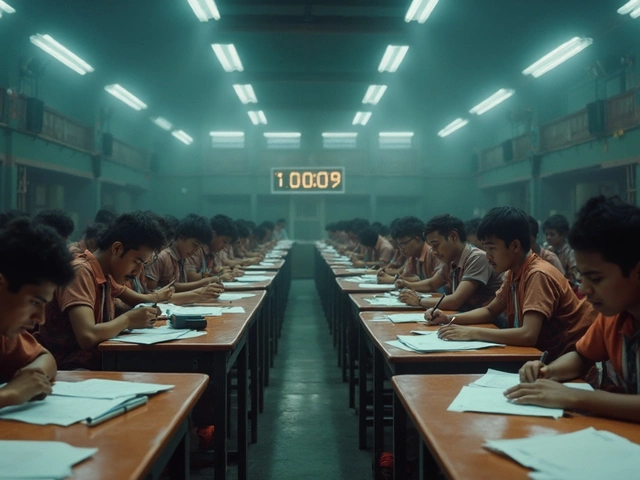In the realm of education, certain exams are legendary, not just for their content but for the sheer difficulty in passing them. These are the tests that push candidates to the brink, both mentally and emotionally. Whether you're aiming for a coveted university spot or a prestigious government position, these exams stand as formidable barriers—albeit surmountable with the right preparation.
The competitive exam landscape is riddled with such trials, each with its unique challenges. As we embark on a journey to explore these titans of testing, we’ll uncover what makes them stand out and how one might emerge victorious amidst the intense pressure. For the aspirants daring to conquer these exams, insight and strategy are just as indispensable as knowledge itself.
- Notoriously Difficult Exams Worldwide
- The Gaokao: China's National College Entrance Examination
- UPSC: Cracking India's Civil Services Exam
- Tips for Navigating Competitive Exam Challenges
Notoriously Difficult Exams Worldwide
The world of competitive exams is an unyielding arena, where success isn't guaranteed by mere brilliance but by unwavering perseverance and strategic preparation. These exams are gateways to prestigious institutions and coveted job roles, making them a hotbed of fierce competition. Aspiring candidates often spend years mastering the art of test-taking, sifting through every nuance of the vast syllabuses that these exams encompass. But what precisely makes these exams so fearsome? Let's delve into the specifics that contribute to their daunting reputation.
The French Aggregation, for instance, is legendary for its inflexibility and exhaustive nature. This teaching certification exam spans several weeks, covering in-depth oral and written components that demand not only academic brilliance but also mastery of pedagogy and expression. Candidates often spend years preparing, aware that only a handful will secure a pass among thousands. Similarly, Japan's National Center Test for University Admissions tests students over two grueling days. With questions spanning subjects as varied as language proficiency, mathematics, and science, it decisively shapes the academic future of the students involved.
"The beauty of these exams lies not in their fairness but in the immense discipline they impart," said renowned educational theorist Jean-Claude Filloux.
Another formidable contender on the list is the Korean SAT, known as Suneung. Conducted annually, it plays an integral role in determining university placements, and the entire nation measures its heartbeat to its schedule. The stakes are palpably high, often likened to life exams, and societal pressures weigh heavily on students. Streets fall silent, aircraft halt their courses, and workplaces adjust hours—such is the unwavering respect for focus and concentration.
The Chartered Financial Analyst (CFA) exam takes a different path, focusing on professionals immersed in the finance world. Divided into three rigorous levels, each stage challenges one's grasp over investment tools, ethics, and portfolio management across an extensive syllabus. With pass rates traditionally below 50%, the journey towards CFA charterholder status is both demanding and rewarding, affirming one's expertise in a highly competitive field.
While it's easy to paint these exams as simply diabolical hurdles, they're also revered, symbols of tenacity and intellect. They demand more than rote learning—they require a deep commitment to understanding, a honed strategy for addressing complex problems under pressure, and an unshakeable focus. For those who dare tame these titanic tests, the rewards are profound, ushering a career-altering or life-defining change.

The Gaokao: China's National College Entrance Examination
Considered one of the toughest educational tests in the world, the Gaokao serves as the gatekeeper for higher education in China. This competitive exam, held annually, determines the future of millions of high school graduates as they vie for spots in Chinese universities. Known as the National College Entrance Exam, the Gaokao is a formidable marathon. It’s a nine-hour examination spread over two days, designed to evaluate students in various subjects such as Chinese, Mathematics, and a foreign language, typically English. The level of difficulty and the consequences of the scores put enormous pressure on students, making preparation a daunting affair.
One of the unique aspects of the Gaokao is its capacity to significantly impact a student's life trajectory. Unlike other educational systems where multiple factors might influence college admissions, the Gaokao score is predominantly decisive in China. This has led to an education culture focused intensively on test preparation from early years. Candidates and their families invest heavily in schooling, tutoring, and study materials to ensure high performance. This focus is not without criticism, as some argue it emphasizes rote learning over critical thinking skills. The societal influence of the Gaokao is immense and, due to its nature, students often experience heightened stress levels.
In a country with a population exceeding a billion, the competition for higher education resources is extreme. In 2024 alone, there were approximately 12 million students taking this examination, highlighting the vast scale and stakes involved. The top achievers secure spots in the coveted Double First-Class Universities, setting them on paths towards prestigious careers. However, the system has its share of pressures and challenges. A quote reflecting on this comes from a report by the Asia Society, stating, "The Gaokao is as much a social phenomenon as an educational policy; it reflects the values and aspirations of China’s education system."
With competition so fierce, students and educators continue to look for effective ways to prepare. Balance between intense study and mental well-being is crucial. Some schools have begun implementing mindfulness and relaxation techniques to help manage stress. Others focus on creating a more diversified academic experience, integrating discussions and projects to foster a broader educational experience. Educators worldwide are often fascinated by the commitment and discipline Gaokao asks of students, though they remain critical of the pressure-induced environment it fosters.
To offer a snapshot of the Gaokao’s challenge, consider the scoring: a total score of over 400-500 out of 750 is usually needed to get into top-tier universities. Yet, merely reaching competitive scores isn't enough; it must be accompanied by strategic study plans. Humble beginnings through diligent preparation, subject focus, and mental resilience can elevate one’s prospects amidst millions. While students navigate it yearly, the Gaokao remains a testimony to the intense pursuit of academic success in a rapidly evolving society.

UPSC: Cracking India's Civil Services Exam
The UPSC Civil Services Exam, commonly known as the IAS exam, is one of the toughest exams in India and perhaps the world. Each year, hundreds of thousands of aspirants flock to test centers with dreams of becoming a part of the prestigious Indian Administrative Service, Indian Police Service, or Indian Foreign Service. This exam, conducted by the Union Public Service Commission, is the gateway to the country's most esteemed bureaucratic positions. The preparation for this exam is regarded as a marathon, and it requires a strategic approach that is as much about hard work as it is about smart planning.
The exam is conducted in three stages: Preliminary, Mains, and the Interview (or Personality Test). With each stage serving as an elimination round, the full journey spans nearly a year. The Preliminary Examination, often referred to as 'Prelims,' comprises two papers: General Studies and the Civil Services Aptitude Test (CSAT). Normally, it acts as a screening test to filter candidates for the next stage, where the real battle unfolds in the descriptive Mains Examination. Here, candidates must write essays, elaborate on their understanding of India’s political and social fibers, and eloquently express their thoughts on various issues through different optional subjects.
The key to success in the UPSC lies in a deep understanding of the syllabus and current affairs. It's often advised to stick to limited but reliable resources which are revisited multiple times. The Hindu newspaper, NCERT books, and monthly current affairs magazines become the lifelines for most candidates. Also, the ability to connect contemporary issues with historical perspectives is invaluable. Many candidates form study groups, partake in discussions, and join coaching classes to refine their preparation. As former IAS officer Anudeep Durishetty once stated, "The competition is not just with others but also against time and one's weaknesses."
Effective time management is crucial when navigating such vast content. Candidates often devise a strict timetable, allotting ample time for reading, revision, and mock tests. Mock tests, in particular, play a vital role, helping aspirants gauge their progress and be exam-ready. A strategy that incorporates regular practice of answer-writing can greatly enhance confidence and time efficiency during the actual exam. Post the Mains, the final lap is the Interview round, where a panel assesses the candidate's personality and suitability for public service. Here, the focus shifts from knowledge to demeanor and problem-solving abilities.
While the success rate is slim, with less than a thousand making it through each year out of several lakh aspirants, the allure of serving the country continues to drive many passionate individuals. Aspirants often face multiple attempts, and persistence, resilience, and adaptability become their greatest allies. The journey is transformative, irrespective of the outcome. For aspirants aiming to conquer this giant, holding on to motivation while remaining flexible in methods is essential, understanding that the path is as rewarding as the destination.

Tips for Navigating Competitive Exam Challenges
Tackling competitive exams is rarely a straightforward path. It requires a blend of intellect, strategy, and resilience. Begin by creating a robust study plan, tailored to your strengths and weaknesses. An effective approach involves segmenting broad subjects into manageable topics. By steadily conquering each segment, a sense of progress and confidence builds. Candidates should allocate specific time slots daily, ensuring that every subject receives the attention it deserves while also leaving room for periodic revisions. Time management is crucial, especially for exams with extensive syllabi.
Practicing past papers can significantly boost your preparation. This not only familiarizes you with the exam format but also helps in identifying common patterns and frequently asked questions. Regular practice sessions under timed conditions enhance one’s ability to manage pressure and improve the accuracy of answers. Equally important is integrating rest and relaxation into the study regime. Overworking without breaks can lead to burnout, diminishing one's ability to retain information.
"Success is not the key to happiness. Happiness is the key to success. If you love what you are doing, you will be successful," highlighted by Albert Schweitzer resonates deeply for aspirants who might find joy amidst the rigorous preparation process.
Embracing Technology and Resources
Digital resources provide a significant advantage in test preparation. Platforms offering mock tests, flashcards, and interactive modules make learning engaging. Technology also bridges the gap to global forums where students share strategies, insights, and motivational stories, providing mutual support. Consider joining study groups, whether local or online, to boost mutual accountability among peers. Group discussions can unravel complex topics, ensuring that no stone is left unturned in understanding core concepts.
The role of physical well-being during preparation cannot be overstated. Adequate sleep, a balanced diet, and regular exercise are pillars that support mental agility. The mind is sharpest when the body is nurtured. Candidates are encouraged to indulge in hobbies or recreational activities, which serve as effective stress busters. Balancing study and leisure can significantly improve productivity during study hours.
Mindset and Attitude
Maintaining a positive mindset throughout the exam journey helps in overcoming challenges. Emphasize growth over fixed mindsets; each failure or mistake is merely a stepping stone for better attempts. Visualization of goals can enhance focus and motivation. Seeing oneself as successful bolsters morale, pushing candidates to persevere through tough times. Building resilience is key; setbacks should fuel determination rather than despair. Remember, competitive exams often test endurance as much as they test knowledge.
In the final leg of preparation, simulated exam environments can be immensely beneficial. Dress up and take mock tests under realistic settings to develop a psychological edge. It accustoms candidates to the pressures of the main day. Reflect on performance post each test, and adjust strategies as needed. Meticulously planning the days leading to the exam can ease pre-exam anxiety. Trust your preparation, and step into the exam confidently.



